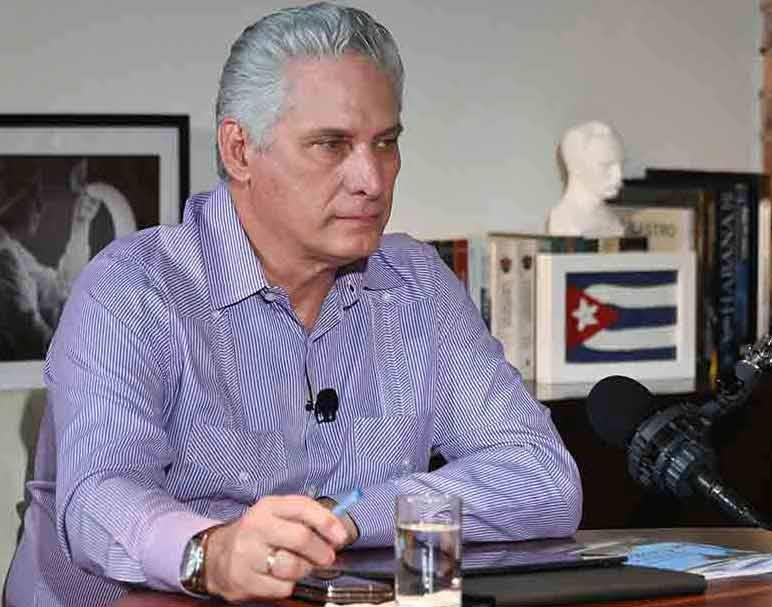
Havana, May 3.- Regarding water, an essential resource for the quality of life of the population, Miguel Díaz-Canel Bermúdez, First Secretary of the Central Committee of the Communist Party of Cuba and President of the Republic, spoke today with Antonio Rodríguez Rodríguez , president of the National Institute of Hydraulic Resources (INRH), during the most recent program of Desde la Presidencia.
In the space, conducive to dialogue, information and debate, led by the president, the negative states of opinion of citizens in relation to the issue were analyzed, as well as the work carried out in cities and communities of the country, according to the summary shared by the Presidency site.
In addition, they delved into the development strategy aimed at changing the energy matrix of the largest of the Antilles, the import of new equipment and the strong effects caused by the United States blockade in this sector.
At the beginning of the broadcast, Díaz-Canel recognized the complexity of the issue, because despite the considerable efforts being made in the country to support important investments with the purpose of solving water supply problems, the obsolescence that has great part of the installed equipment, which causes multiple breakdowns and discontent among the population.
After commenting on several highly critical opinions about the situation with the water supply, Díaz-Canel asked his guest to explain the current situation, its main causes, projections, willingness and commitment to overcome the difficulties that arise.
The President of the INRH recognized that the states of opinion of the people coincide with real problems that affect both the water supply and the solution of leaks or the management of sewage, a reality largely conditioned by the breakdown of equipment, the lack of maintenance and spare parts and accessories, but above all due to the lack of fuel, said Rodríguez Rodríguez.
The sector is one of the largest consumers of energy in the country, and when the allocation deficit occurred, there have been days in which 70 percent (%) of the affected population, in terms of water supply, has been due to a deficit. of electrical energy.
There are pumping systems, he explained, that are fed by three different circuits, and despite the close coordination that exists with the Electric Company, it is not always possible to protect all the circuits because they are not in the center of the city or in prioritized areas. but in remote places of the territories.
Hence the importance that the official attached to continuing to promote communication with the people, so that they are aware of the actions that are carried out and what the situation in a certain place is due to.
Díaz-Canel made reference to acts of corruption that manifest themselves in the water service with pipes, which he classified as reprehensible behavior.
The dialogue then turned to another pressing issue: leaks. While dozens of families have a critical situation associated with water supply, in various places thousands of liters of drinking water are dumped daily as a result of leaks.
The President of the National Institute of Hydraulic Resources explained that the technical state of much of the equipment makes it more difficult to solve this problem and argued that, although between 2006 and 2007 the hydraulic resources sector was one of those who benefited most from the Energy Revolution, at which time more than 80% of the equipment was replaced, in the following years the necessary repairs could not be carried out.
Only in 2023, he stated, was it possible to resume part of these actions, but financial limitations prevent making all the necessary changes, with the repair of the equipment being the most expeditious way to solve the problem.
The change in the energy matrix in the sector based on the use of renewable energy sources was also addressed in the dialogue.
Rodríguez Rodríguez specified that for this they received a first batch of 722 equipment, which will benefit, along with the 144 that were already in the country, more than 440 thousand people.
In this regard, he commented that all the equipment that is currently installed works with electrical energy and these new ones that are being imported will work with solar panels, which gives them autonomy, independence and stability.
In the midst of the current scenario, conditioned largely by the intensification of the economic, commercial and financial blockade imposed by the Government of the United States, the president recognized, the efforts being made to carry out strategies that allow for continuing to promote investments in the hydraulic sector aimed, among other directions, at improving services, changing the energy matrix, making greater use of renewable energy sources, improving waste disposal and overcoming deficiencies that currently exist.
Shortly before concluding the broadcast of the Program, Díaz-Canel wanted to know when and how the three fundamental problems could be resolved: leaks, supply and sewage.
In this regard, Rodríguez Rodríguez explained that there is a comprehensive development program until 2030 in which progress has been made in accordance with the availability of resources.
From 2018 to 2021, 68% of what was planned was achieved and, between 2023 and 2024, 75%.”
We aspire to have a better situation next year, although that does not mean that we are going to solve all the problems of leaks, obstructions, water supply and others, he pointed out.
"We are going to continue working tirelessly, but telling you now a date by which we can have resolved all the problems would not be fair on my part because it is not possible to know exactly," he said. (ACN) (Photo: PL)